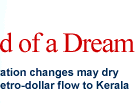

|
|
|
|
| HOME | BUSINESS | REPORT | |||
| September 30, 1999 |
 
D Jose in Thiruvananthapuram The flow of petro-dollars, which supports thousands of households in Kerala and sustains its economy to a great extent, is likely to slow down in the next century, according to an exhaustive migration study conducted by the Centre for Development Studies, an autonomous organisation. The study reveals that the net out-migration from the state would turn negative early in the next century, bringing the economy under severe stress. This is due to a sharp decline in the out-migration and an increase in return migration. The study was conducted by Dr S Irudaya Rajan, K C Zachariah and E T Mathew with the financial assistance of the Indian Council of Social Research under its Indo-Dutch Programme
The number of return migrants is likely to increase to about 1.3 million by the turn of the century and to 1.8 million by the year 2002. The study has taken into account only those Keralites who have roots in Kerala for determining the number of migrants. In terms of community profile, the Muslims constitute nearly 50 per cent of the emigrants and account for over 47 per cent of the annual remittances. The Christians take the second place with 20.5 per cent of the emigrants and 24.5 per cent of the remittances. The Ezhavas, who form the second largest community after Muslims in the state, account for only 14 per cent of the emigrants and for as much percentage of remittances. The upper caste Nairs come fourth. The Scheduled Castes and Tribes are left out far behind. One major factor for the declining trend in out-migration is the decrease in the number of persons in Kerala in the migration age groups as a result of the demographic changes. A slowdown in the economy of the Gulf countries and stiffer competition from well-trained workers from other countries in south and southeast Asia are other factors. The conclusion arrived at is that the migration would continue to increase for some more years, but return migration would increase at a faster rate. "Early in the next century, there would be another turnaround in the migration trend. The number of return emigrants would become larger than the number of out-migrants and net migration would turn negative," the study said. The rapid increase in the return of migrants could pose serious social and economic problems in Kerala. The major problem relates to the rehabilitation of these people. The task is tough as majority of the returnees hail from poor families without proper education and technical skills. The study has pointed out that about 16 per cent of the migrants have just primary education. As regards technical skill, 80 per cent have no formal training at all, and only 20 per cent have a certificate, diploma or degree in a technical subject. The research shows that 38 per cent of the migrants were self-employed and 26 engaged in non-agricultural sector as labourers. A large majority of the people returning from the Gulf opt for self-employment. The research showed that there is a 24 per cent shift in favour of self-employment. The savings the migrants have are a good source for self-employment. The task of the government can be easy if it can create the right milieu for these people to take up self-employment with a sense of security and confidence. The study recommends bold steps by the government to mobilise the resources locked up in the banks for the industrial development. The NRI deposits in banks have been witnessing a steady 20-25 per cent increase per year in the past one decade. The total NRI deposits in banks in 1998 were Rs 127 billion. The reason for locking the money in banks seems to be the lack of faith among the migrants to invest it in the state. "Migrants seem to have little faith that the investment would bring them a safe and reasonable return in the prevailing work culture in Kerala," the study said. The study suggests identification of development projects in which the emigrants have a stake and reasonable assurance of return for utilisation of NRI funds and savings of returned migrants for the development of the state. This would give a spur to the growth in the productive sector and in turn would increase the employment avenues. Paradoxically, the state has been slipping into a debt trap even when the banks are flush with NRI remittances. The government debt increased from Rs 88 billion in 1994-95 to Rs 180 billion in 1998-99. The interest on loans saw a 100 per cent increase during this period. The loans being availed by the government every year could not be deployed in the productive sectors, as a substantial chunk of it went towards interest payments. The signs of the looming debt trap were available in the latter part of the nineties, when the revenue deficit shot up from Rs 4 billion to Rs 22 billion. The main reason for this was the steep increase in the expenditure, especially non-developmental expenditure. The major components of the increased expenditure were salary to employees and pension payments to various sections of the people. The increase in expenditure on account of salaries was 125 per cent and pension 180 per cent in the past four years. The expenditure on salary mounted from Rs.22.31 billion in 1995-96 to Rs.48.51 billion in 1998-99. The Kerala government started borrowing money in large scale to meet the revenue deficit during this period. The economic experts have warned that the economy would become unsustainable if the government did not take immediate steps to give a boost to the productive sectors. |
| Tell us what you think of this report | |
|
HOME |
NEWS |
BUSINESS |
SPORTS |
MOVIES |
CHAT |
INFOTECH |
TRAVEL |
SINGLES BOOK SHOP | MUSIC SHOP | GIFT SHOP | HOTEL RESERVATIONS | WORLD CUP 99 EDUCATION | PERSONAL HOMEPAGES | FREE EMAIL | FEEDBACK |
|